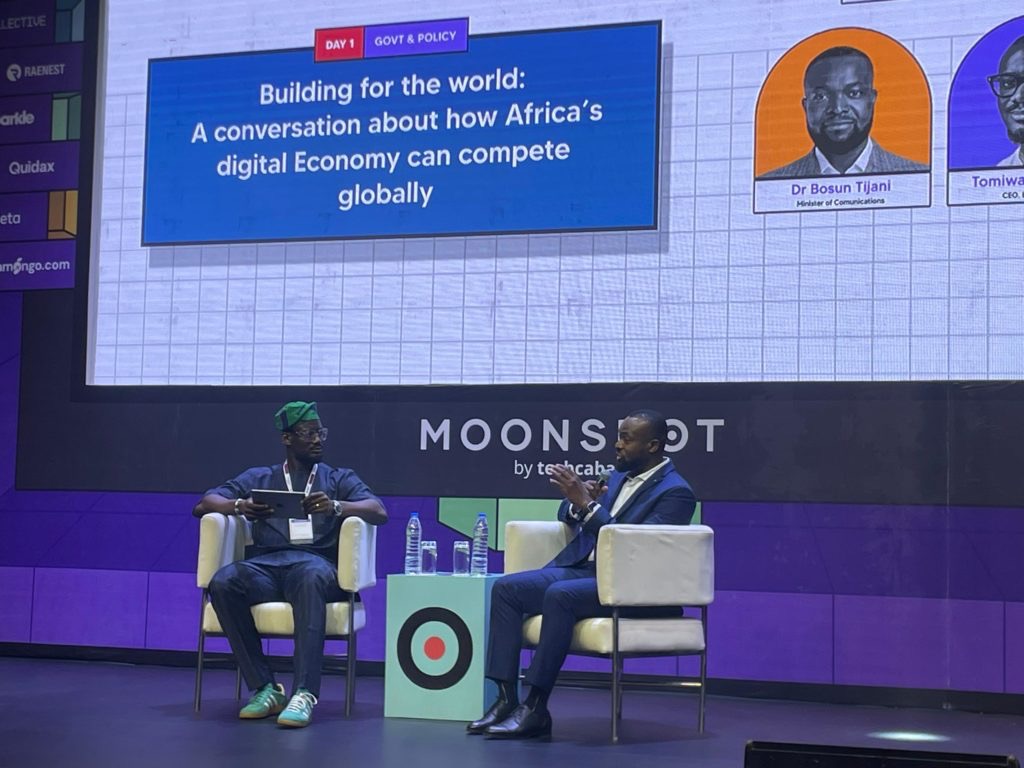Image Source: Tech Cabal
In recent years, Nigeria has emerged as a key player in Africa’s technology space, with innovative entrepreneurs and a growing tech-savvy population eager to drive the country forward. Bosun Tijani, the country’s Minister of Communications, Innovation, and Digital Economy, is determined to harness this momentum through artificial intelligence (AI). Speaking at the Moon Shot event in Lagos, Tijani outlined his vision to transform Nigeria into an “economic powerhouse” by capitalizing on AI’s potential, despite the country’s infrastructural challenges.
The AI Vision for Nigeria
Artificial intelligence, Tijani believes, is more than just a technological innovation—it’s the gateway to Nigeria’s economic future. “We would have failed our people and the future generation if we sleep on artificial intelligence,” Tijani remarked in a discussion with Tomiwa Aladekomo, CEO of Big Cabal Media. His point was clear: AI is not just another tool; it’s a force that will shape how we live, work, and think in the years ahead.
But is Nigeria ready for AI? Critics argue that the country should focus on more immediate problems like electricity shortages and education. Yet, Tijani firmly believes that Nigeria cannot afford to “focus on weaker problems.” In his view, AI represents a golden opportunity that the country must seize now or risk falling behind.
AI and Nigeria’s Unique Opportunity
Tijani’s strategic vision for Nigeria is rooted in leveraging its untapped data potential. Large language models (LLMs) like GPT, which power many AI applications, currently lack context on Africa. Tijani believes Nigeria can step in to fill this gap by digitizing African data. “It’s a business opportunity that continents like Africa should be leading,” Tijani explained, highlighting the enormous potential for Nigeria to become a leader in the global AI landscape.
In this context, AI is not just a futuristic concept for Tijani—it’s a practical avenue for economic growth. By contributing localized data to AI models, Nigeria can carve out a niche that not only helps to modernize the country but also positions it as a global player in the AI-driven economy.
Five Pillars of Nigeria’s AI Strategy
To bring this vision to life, Tijani’s ministry is focused on five key pillars:
1. Investing in Talent
Tijani’s first priority is talent development, specifically through the ambitious Three Million Technical Talents (3MTT) program. This initiative aims to equip Nigerians with the technical skills needed to drive technological progress. In an era where digital skills are in high demand globally, Nigeria has the potential to become a “net exporter of talent.” The government, according to Tijani, must invest in building this pipeline early to ensure that technology can truly drive the nation’s growth.
2. Building Infrastructure for the Digital Economy
No digital revolution can succeed without a robust infrastructure. “Without connectivity, there’s no digital technologies that can truly scale,” Tijani asserted. To remedy this, the ministry has plans to expand Nigeria’s fiber optic network, aiming to lay an additional 90,000 kilometers of backbone fiber, bringing the total to 125,000 kilometers. This expanded network will provide the essential infrastructure for scaling AI and other digital technologies across the nation.
3. Creating Pro-Innovation Policies
While infrastructure is crucial, it’s only part of the solution. Tijani stressed the importance of policies that support innovation, rather than stifling it. “Our policies should be pro-innovation and not just be there for revenues,” he said. Policymaking in the digital era must be forward-thinking, encouraging experimentation, entrepreneurship, and technological advancement. It’s about creating an environment where innovators can thrive and where new ideas can come to life without unnecessary red tape.
4. Encouraging Private Sector Engagement
The fourth pillar focuses on partnerships with the private sector. Tijani knows that government alone cannot drive the AI revolution. By engaging with private companies, from local startups to global tech giants, Nigeria can accelerate its digital transformation. The minister has already begun forging partnerships and securing funding for AI projects, including the launch of an AI collective backed by $1.5 million in August 2024. This collective is aimed at promoting AI-driven innovations across various sectors of the economy.
5. Future-Proofing Nigeria’s Economy
Tijani is acutely aware that the AI revolution will bring profound changes to the job market. While AI will undoubtedly create new opportunities, it could also lead to job displacement in certain sectors. To address this, the ministry is focused on future-proofing Nigeria’s economy by ensuring that workers are equipped with the skills they need to thrive in an AI-driven world. Through continuous education and upskilling programs, Nigeria can prepare its workforce for the inevitable changes ahead.
Addressing the Skeptics
Despite Tijani’s optimism, skepticism remains. Critics have pointed to Nigeria’s infrastructure deficits, such as unreliable electricity and limited internet access, as obstacles that could hinder the country’s AI ambitions. However, Tijani maintains that focusing on these challenges alone is a short-sighted approach. In his view, building Nigeria’s digital future means tackling multiple challenges simultaneously. AI, he argues, offers a pathway to address these very issues by driving economic growth and creating the financial resources needed to solve them.
Tijani’s stance is clear: Nigeria cannot afford to wait until all its problems are solved before embracing AI. Instead, the country must take bold steps to position itself at the forefront of the global AI revolution.
A Legacy of Platforms
Looking beyond his tenure as minister, Tijani wants to be remembered for building platforms—both literally and metaphorically. His three-pronged approach involves expanding Nigeria’s digital infrastructure, introducing a geographic information system (GEO), and transforming how the government utilizes technology. These platforms, according to Tijani, will serve as the foundation for Nigeria’s future digital economy.
Tijani’s vision for Nigeria is grand, but it’s also grounded in the belief that technology can be a powerful tool for change. By building platforms and fostering innovation, he hopes to create a legacy that will not only transform Nigeria but also inspire other African nations to follow suit.
Bosun Tijani’s ambitious AI strategy for Nigeria is a bold attempt to future-proof the country’s economy. By focusing on talent development, infrastructure expansion, pro-innovation policies, and private sector engagement, Tijani believes Nigeria can not only catch up with but also lead the world in AI innovation. As the global economy increasingly revolves around data and digital technologies, Nigeria’s proactive stance on AI could very well be the key to unlocking its potential as an economic powerhouse.















 and then
and then